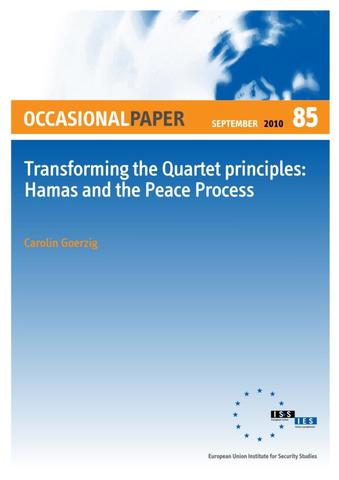You are here
Transforming the Quartet principles: Hamas and the Peace Process

Despite the clear necessity of an inclusive approach that involves all relevant actors, the Middle East Quartet (comprising the United Nations, the United States, the European Union and Russia) has made political and financial cooperation with the Palestinian Authority dependent on the recognition of the three Quartet principles — the recognition of Israel, the renunciation of violence and adherence to previous diplomatic agreements — in exchange for the recognition of a Palestinian government. But instead of compelling Hamas to consider compliance, the Quartet principles have in fact led the group to become more entrenched in its defiant stance. There is a fundamental problem with the three Quartet conditions. While decision-makers proclaim that the three principles come as a package and are inseparable, it is precisely the fact that they are so interlocked and that Hamas is required to comply with them simultaneously that makes compliance problematic. This is the case because the three principles are mutually constraining to such an extent that complying with one principle effectively prevents Hamas from complying with another. Originally, the three Quartet principles were intended as a basis or a framework for a potential peace process. They define the conditions a negotiating partner has to fulfil in order to take part in Middle East peace talks. In reality, however, they have acted as an impediment. This paper seeks to find a way of overcoming the constraints that the EU has imposed upon itself by insisting on simultaneous adherence to the three Quartet principles. It looks at what room for manoeuvre there remains for the EU within the framework of the Quartet conditions and at how they can be modified in such a way that they facilitate rather than obstruct compliance.